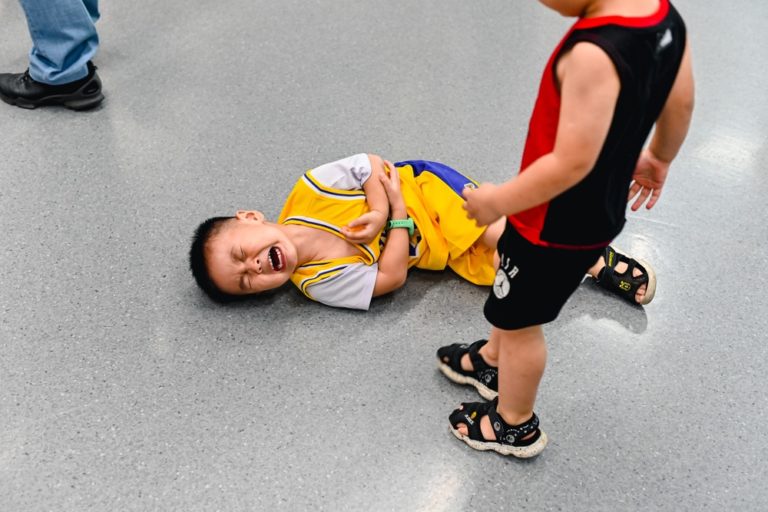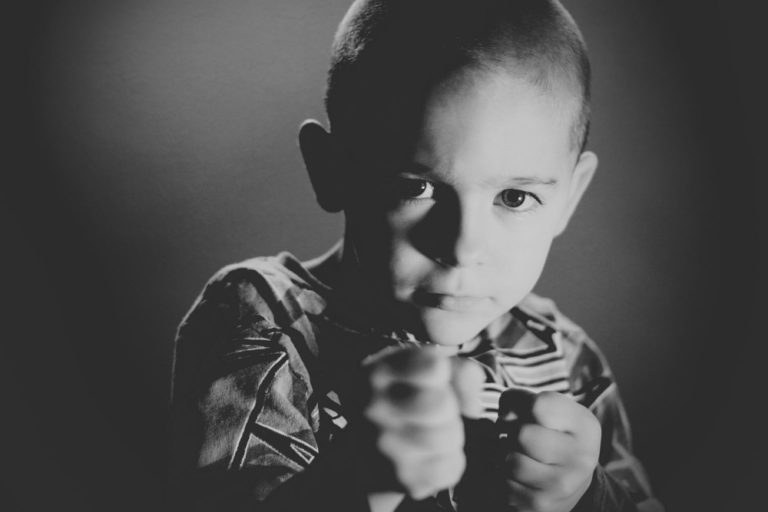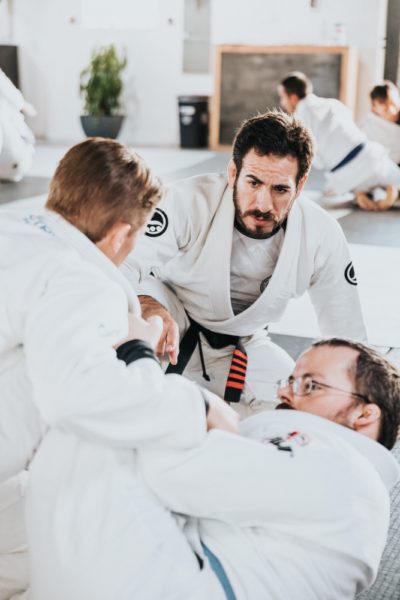Does fighting back stop bullying? (What do we tell our children?)


By Antoine G Larosiliere
Growing up there were two ways to handle a bully; become the funny kid and roast them, or punch their lights out. The reality is times have changed, and we all have to take an honest look at the question, does fighting back stop bullying?
As a parent I understand how angry and helpless we feel when our children come home and tell us they’re being bullied. As an educator, it breaks my heart when I see a student suffering at the hands of a bully. Both as a parent and educator, we must ask ourselves, does fighting back stop bullying? Imagine if we knew the answer to that, then we could just focus on the right course of actions to rid the bullying. The answer to that is, “it depends.” You should only defend yourself against physical violence, especially if it’s a life threatening situation and running away isn’t a viable option. If the bullying isn’t physical, your child should not respond physically. If they do, they can potentially face more severe consequences.
“Research shows that both parents and schools are failing to prepare their children on how to deal with bullying.”
What are the consequences for fighting back?
Every parent has had some experience with bullying either during childhood or in our adult lives. This inevitable journey will be the same for our children. Research shows that both parents and schools are failing to prepare their children on how to deal with bullying. So, many parents have taken matters into their own hands and tell their children to fight back. Does fighting back stop bullying? Unfortunately using violence to fight violence doesn’t work. If you tell a child to do just that, more often than not, the violence will either continue or escalate. In Australia, “90 poeple died in 2000 due to one-punch assaults to the head, or when they fell unconscious, striking their skulls against the ground.” A few possibilities your child may face if they react to bullying with physical violence is….
- The bully could possibly want revenge and try to fight your child again.
- The bully might start spreading rumors and lies about your child as payback.
- The bully might resort to other forms of bullying like cyber-bullying.
- The bully might get his friends to jump your child.
- The bully might take their frustrations out on another innocent victim.
- The humiliation might cause the bully to hurt themselves.

What role does the “Law of reciprocity” play?
The universal “Law of Reciprocity” can help to explain why we shouldn’t always respond to violence with violence. The “Law of Reciprocity” simply states that whatever you do, will be done to you. For instance, If a bully is physically aggressive with your child, the “Law of Reciprocity” states someone will be aggressive to them. It could be the victim, in this particular case; your child, or someone else. If your child chooses to respond violently to the bully, the “Law of Reciprocity” states someone will be violent towards them. Once again the reciprocating party doesn’t have to be the bully. This universal law affects us all whether we choose to believe it or not. In the bible, it’s referred to as “The Golden Rule.” Some of us don’t always see the effect of it, because we expect the reciprocation to come from the person we’ve injured; but that’s not always the case. I also do believe intent can affect reciprocity. In other words, if your child’s intention is to defend themselves from harm and not inflict harm unto others; no harm will be reciprocated to them. Violence does beget violence, but it’s important to teach our kids to fight back with the intention of only defending and protecting themselves.
What happens if you don’t fight back?
I understand that it’s also our job as parents to prevent our children from becoming bullies. It’s also the educator’s job to address bullying in the schools in hopes of deterring it and keeping children safe. But with so much effort to eradicate bullying, it appears not to be going away. The world is a cruel place filled with mean kids that grow up to be mean aults. And if you never fight back, this cruel world could eat you alive. Some psychologists even argue that when physical attacks are not met with some degree of physical response, they tend to happen again. Some possibilities that are likely to occur if your child doesn’t fight back are…
- The bully will continue to harass your child
- Your child may become depressed.
- Your child may consistently avoid difficult situations.
- Your child may develop anxiety disorders.
- Your child may develop sleep disorders or physical ailments.
- Your child may bully others.
- Your child may not gain any confidence and develop low self esteem
- Your child’s school grades might suffer.
- Your child may turn to alcohol and drug use.
- You child might start having suicidal thoughts
- Your child may grow up to be an adult that doesn’t stand up for themselves.

When should you run?
Just like there will be a time you must stand up for yourself, there will be a time you may need to run as well. If we are to continue to advocate this notion of safety first, then we need to consider all options of staying safe. There might come a time where it’s better to be alive and called a coward, or to be dead or seriously injured and called brave. In fact, “a growing number of clinical psychologists say that teaching our kids to ‘take the hit and seek support later’ is not the way to curb bullying.” With that being said, your child should run away from a fight with a bully…
- When the bully is twice the size, or significantly older than your child: Your child could be seriously injured if they get into a physical altercation with the bully.
- If your child is out-numbered: Your child will live to be able to face each one on more fair terms.
- If your child can’t fight and there are no witnesses: No one will witness that they ran.
- If your child is sick, or already injured: Your child can potentially make their physical ailments worse.
- If your child is accompanied by someone who can’t defend themselves: Fighting back will endanger them, while running will prevent injury for the moment.
- If your child is bigger than the bully and the bully doesn’t pose an immediate threat: In this case, your child should shove the bully off them and walk away. Very little respect will come from beating up someone much smaller than your child.
When should you fight?
I’m not advocating violence, and we should all be aware that violence usually begets more violence. But, if there is a time to run and avoid fighting, then there is also a time to defend yourself. To constantly tell your kids to not “fight back,” “ignore it” or “walk away,” even when healthier options exist is a detriment to any self-confidence they can have. Several studies of elementary school-aged children have found “being submissive to peers and not retaliating or ‘standing up’ for one’s self increases the risk of continued bullying. For your child to have the courage and ability to protect themselves in the presence of physical aggression is transformative to their self-worth and confidence. Your child should be encouraged to defend themselves or “fight back” when…
- They are cornered and there are no adults present and no means of escape from physical violence.
- When physical violence is imminent and other options have been exhausted.
- To help someone who can’t defend themselves when adults aren’t present.

How should you fight back?
How you fight back is equally important as when should you fight back. Your child’s actions have to be thoughtful and under no circumstance careless, to prevent them from being seen as the aggressor. Dr. Andrew Mendonsa, a psychologist who works with children, said children should keep in mind that self-defense does not have to mean physical violence. To help your child fight back and not be seen as the aggressor, you must…
- Help them acquire the skills needed to defend yourself.
- Help them seek some form of martial arts training.
- Make sure your child’s training focuses on redirecting energy or their opponents’ aggression.
- Role-play the appropriate situations with your child to perform the skill.
- Make sure your child’s instructor is not an advocate of violence but a protector of peace.
- Discuss with your child the consequences of being careless with their new abilities.
- Teach your child how to recognize potentially dangerous situations.
Once again, I’m not an advocate of physical violence. But I would use it as a last resort to protect myself and my family. I teach my children to do the same and they know I would support their conscientious decisions to protect themselves. Hopefully this article will help you make the right decisions for your family. Also visit my YouTube channel for more insight to these topics.
The Bully Experience "Daniel's Story"

Sign up for our newsletter and Read the novel For Free!
Stay updated. Sign up for our newsletter, and get the first two chapters of The Bully Experience Daniel’s Story absolutely free.